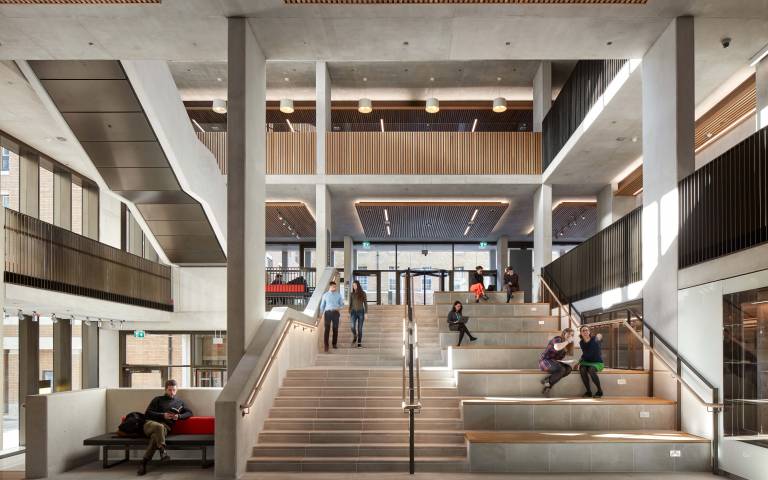UCL Student Centre awarded ‘Outstanding’ sustainability rating
14 May 2019
UCL’s Student Centre has achieved a BREEAM ‘Outstanding’ rating reflecting exceptional environmental, social and economic sustainability performance, just three months after its opening.

The Centre, located at the heart of UCL’s central London campus, has been awarded the highest BREEAM (Building Research Establishment Environmental Assessment Method) rating, recognising its sustainable design and construction.
In order to receive ‘Outstanding’, a building must achieve at least 85% in the body’s overall sustainability assessment. UCL’s Student Centre, which opened in February 2019, achieved 87.2%. In total, only 320 buildings globally have achieved BREEAM ‘Outstanding’ to date.
Professor Anthony Smith, Vice-Provost (Education & Student Affairs), said: “Sustainability is a key part of UCL’s 20-year development strategy, which includes our ambitious Carbon Management Plan, and we are extremely pleased to achieve the highest BREEAM rating for the Student Centre. The fantastic design is sensitive to Bloomsbury’s fine heritage and shows how to deliver sustainable development on a constrained urban site.”
The BREEAM rating considered a range of factors including the building’s life cycle, low-carbon construction methods and sustainably sourced raw materials, operational energy and water use, and indoor air quality.
The 5,764 square metre building, designed by Nicholas Hare Architects and built by Mace, includes an array of sustainability features, including ground-source heat pumps, natural ventilation features, minimal waste through construction and use of highly durable materials. It also benefits from a Japanese style garden, green roof and 250 square metres of electric solar panels.
The Student Centre provides a mix of learning spaces varying in character and size, creating different types of individual study and group collaboration settings, as well as more social learning environments. With 1,000 new ‘study seats’, the building is focal point for university study and events.
As well as reducing UCL’s environmental impact, key sustainability features also help to reduce running costs.
Key sustainability features:
- ‘Passive first’ approach to design based on highly efficient building fabric which helps to regulate temperature and minimize energy use
- Projected 35% reduction in building carbon emissions compared to Building Regulations requirements (Part L 2013)
- Approximately 250m2 of photovoltaics (electric solar panels) on the roof provide clean, renewable energy
- A ground source heat pump system linked to deep boreholes provides ‘free’ summer cooling and also supports heating during the winter
- Windows automatically open to naturally ventilate the building in the spring and autumn
- Efficient sanitary fittings reduce water consumption by more than 50% compared to equivalent buildings
- Healthy and productive study spaces, optimising daylight, indoor air quality and providing a comfortable internal climate
- Highly durable materials will help to minimise resource use associated with maintenance and repairs
- Biodiversity enhancements include planting in the Japanese Garden and a green roof which will also have a positive influence on the microclimate
Richard Jackson, Director of Sustainability at UCL, said: “UCL has set itself some challenging targets for sustainability and this project exemplifies the willingness and passion to achieve these goals. The project team demonstrated a consistent and driven commitment to UCL’s core objectives – including the pursuit of an ‘Outstanding’ rating – all to ensure this scheme is seen as a true exemplar within the higher education sector.”
The Centre is one of the key projects in Transforming UCL, a £1.25 billion ten-year programme of investment in UCL’s estate across London to support the university’s growth. The programme is also seeing the construction of a world-class neurological research centre in King’s Cross and UCL East, an entirely new campus in east London, adjacent to the Olympic Park.
Links
Image
- Nicholas Hare Architects (c) Alan Williams Photography
Media contact
Natasha Downes
Tel: +44 20 3108 3844
E: n.downes [at] ucl.ac.uk
 Close
Close

